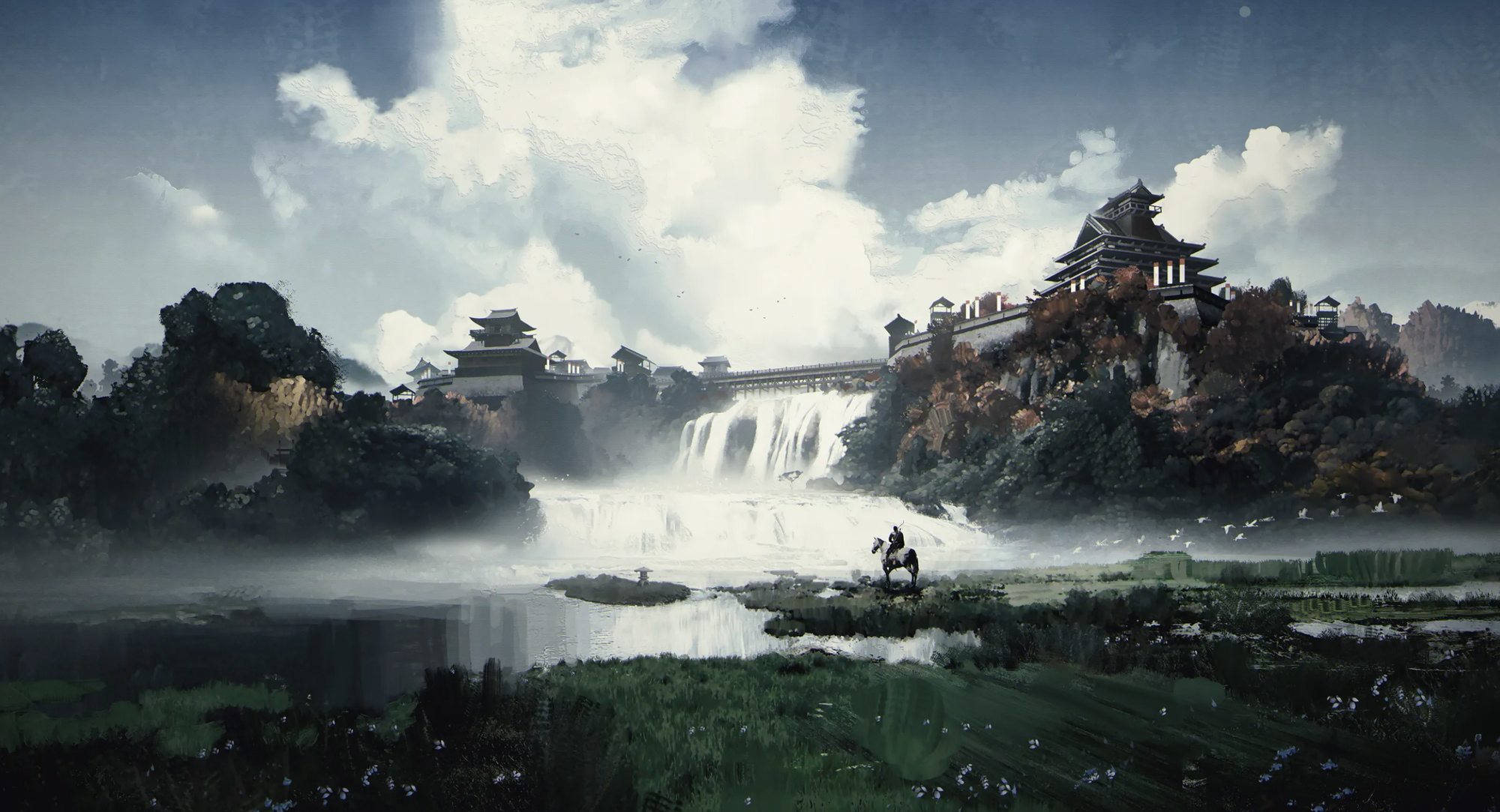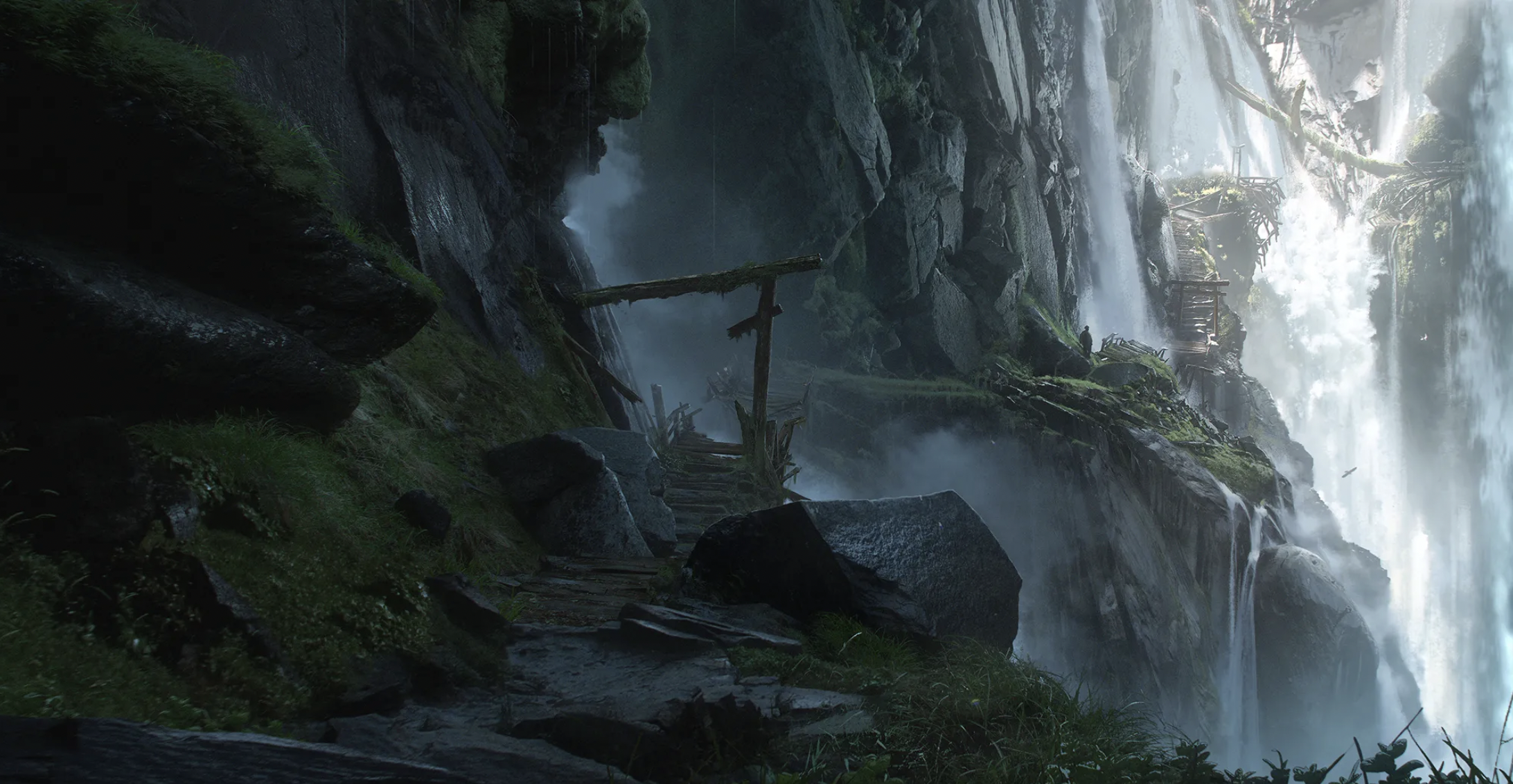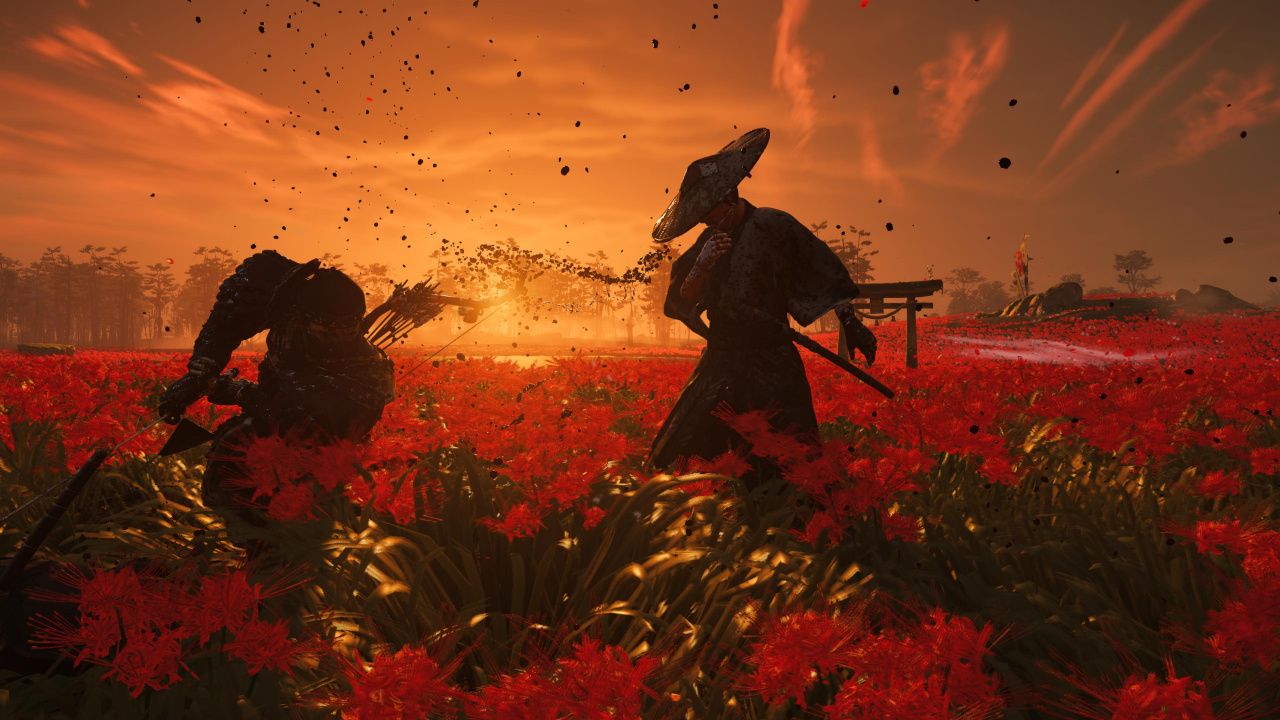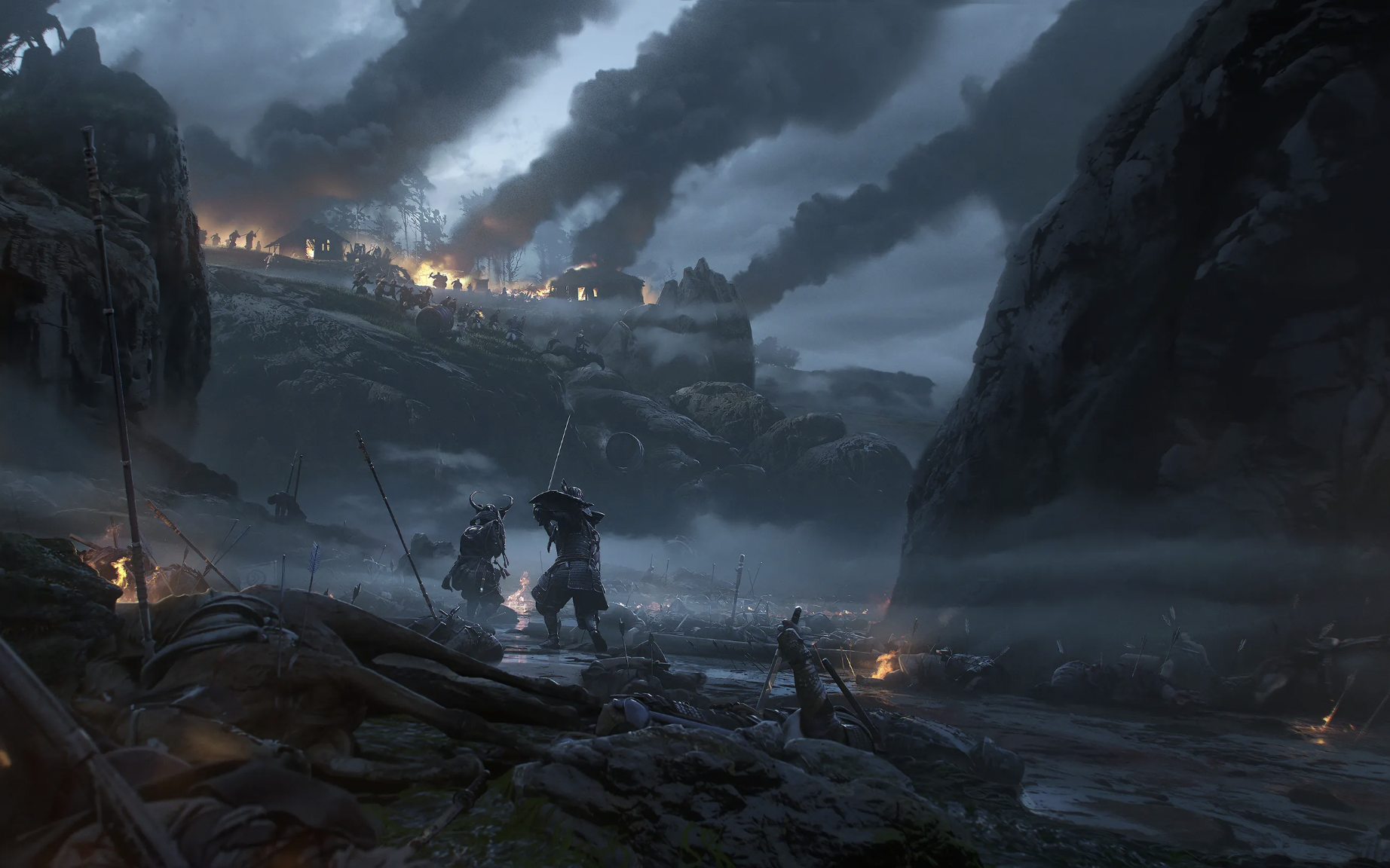Ghost of Tsushima Is About People
How Sucker Punch told their story through individual characters rather than sweeping narrative

\While Ghost of Tsushima has received rave reviews for its action-packed gameplay and stunning visual representation of ancient Japan, I’ve been surprised to see so few people talking about its storyline. While on the surface Ghost of Tsushima’s story can be dismissed as a somewhat typical revenge-by-numbers tale, and its protagonist Jin Sakai hand-waved as a relatively one-note action hero, I don’t think that’s all there is in the tale Tsushima tells.
The reason, I think, that people are missing the depth that Tsushima has to offer is because it doesn’t tell its most important stories during the main plot. Jin’s hunt for Kotun Khan is the bombastic, action set piece that sits atop a narrative that is driven through its accompanying characters. Likewise, while Jin is likable enough and has a relatively strong character arc, even his own story is expressed in his relationships and how he is reflected in those around him.
I think Ghost of Tsushima’s story deserves a lot of credit for the subtle and interesting approach Sucker Punch has taken to telling their story. It’s a story delivered primarily through an outstanding supporting cast.

Yuna & Taka
Yuna is perhaps the most important character in Jin’s story, both in a literal and figurative sense. She saves Jin after his battle with the Khan in the opening sequence and nurses him back to health. More importantly, she is the first character to question his dogmatic adherence to his Samurai code of honor.
In Act I she finds herself at Jin’s mercy, hoping he’ll help save her brother Taka. In Act II, her story becomes far more complex. Jin learns about her past in Yarikawa, and how Japan’s caste system — which has given Jin a life of comfort and opportunity — created an oppressive regime from which Yuna and Taka were never able to escape.
Moreover, much of Yuna’s suffering comes inadvertently from the Yarikawa rebellion, a war that led Jin’s own uncle to subjugate Yarikawa. From Yuna’s tales, Jin sees the other side of his uncle’s actions, and of the Samurai’s dominance of Tsushima.
Both Yuna and Taka also serve as the only prominent characters from the peasantry. They are often used to inform Jin (and in doing so, the player) of how his actions will be perceived by the population of Tsushima.
While Taka’s part in the story is much smaller, Yuna’s single-minded mission of keeping her brother safe is a stark contrast to Jin in Acts I and II — he has no family, nor any real friends, for whom to fight. His conviction comes from a place of revenge, rather than protection. Yuna and Taka help to show how misguided Jin’s motivations are in the early parts of the game.

Sensei Ishikawa
If Yuna is the opposite of Jin, Sensei Ishikawa is often used as a parallel. Much like Jin wants to avenge the Samurai that died in Masako Bay, Sensei Ishikawa wants revenge on the student that betrayed him.
Ishikawa’s story is in-fact foreshadowing of Jin’s relationship with Lord Shimura, his uncle. In both stories, the master trains the student, only for the student to take that training and use it for what the master considers unsavory purposes. Right after the master offers the student adoption, the student abandons the master in favor of their own objectives.
Of course, Tomoe’s defection to the Mongols is far more devious than Jin’s escape from Shimura at the end of Act II, but the point of the story is more about Ishikawa’s reaction than Tomoe’s reasoning. As Jin helps the Sensei track his student, Ishikawa expresses his pain at Tomoe’s betrayal and makes foolhardy and rash decisions as he becomes more and more desperate to track her down.
When we first meet Sensei Ishikawa, Jin is very deferential, playing the role of a dutiful student. As his tale progresses, this changes dramatically. Jin questions Ishikawa’s wisdom and decision-making, and the relationship becomes more and more hostile as Jin learns more about his Sensei’s past.
Ishikawa essentially serves as a dry-run for Jin to question authority, and his early doubts about Ishikawa are the building blocks of his eventual conflict with Lord Shimura.
Lady Masako
Much like Ishikawa, Jin’s early interactions with Lady Masako are centered on revenge, as she hunts her family’s killers at any cost.
If Ishikawa represents Shimura, then surely Masako represents Jin himself. Headstrong and rattled with survivor guilt, the two are at first in perfect unison as they begin the search for those who slaughtered house Adachi.
As Masako’s story unfolds, her ravenous need for revenge eventually overtakes Jin’s own. Jin begins to see her as losing her objectivity and at risk of losing herself. Jin becomes her conscience, trying to help her regain her center, and eventually lecturing her on how revenge will not bring her family back.
Looking at Jin at the beginning of Act I, and again at the end of Act II, it’s clear that Masako is actually a vehicle for Jin’s own change of heart. Much like Masako, he begins the game as a revenge-driven warrior but finishes Act II focused solely on protecting the innocent. This change is never actually spoken about with Jin but is instead demonstrated through his conversations with Masako.
Masako’s story also includes several storylines focusing on the brutality of the Samurai, and a number of her tales involve Clan Adachi’s mistreated servants coming back for revenge. Masako often recounts how she had given lighter punishments to misbehaving peasants, as though she was lenient. In meeting these characters, we see how her lighter punishments are still devastating to those who receive them.
Although barely touched upon, Lady Masako’s Act II story featuring Maki, a servant with whom she had a brief romantic affair, is one of the few examples of a Samurai lord or lady committing a taboo act. Jin’s complete acceptance of this serves to show how far he has drifted from the Samurai ideals.
Masako’s brief heel-turn in Act II is easily the weakest part of her arc, serving only really to show Jin’s forgiving, altruistic nature. It shows that he understands her pain, guilt, and anger, but sees a different path forward that is no longer centered on revenge.

Ryuzo and the Straw Hat Ronin
When we’re first introduced to Ryuzo, Jin identifies him as a close friend. This is immediately contrasted, as Ryuzo is cautious of Jin and shows clear resentment from the moment they meet. We learn quickly that Jin’s defeat of Ryuzo in a duel many years prior dramatically derailed Ryuzo’s life, while it had virtually no effect on Jin.
This is another reminder to the player that Jin is part of the ruling class — a Samurai from a famous family. This is compounded by Ryuzo’s early tales that involve helping him find food for his starving band of mercenaries. In these tales, it’s also quite impactful that Ryuzo often refers to them as ‘My friends’, while Jin refers to them as ‘Your men’.
Despite this adversarial relationship, I was truly surprised at Ryuzo’s betrayal at the end of Act I. To this point, Jin’s allies were flawed but stalwart, so having his childhood ‘friend’ betray him not only served as a compelling twist, but it also put into doubt the loyalty of other companions — especially Yuna, who was now reunited with her brother, had little reason to continue to help Jin.
This also made the Straw Hat Ronin particularly villainous, and each time one of them showed up during a tale, that quest became even more personal. The Ronin will often remark during combat that the Samurai have failed, and are no more, driving your hatred of them further. Witnessing Ryuzo being pressed into service for the Mongols made him a sympathetic villain, something lacking in Kotun Khal.
Ryuzo’s ultimate defeat at the end of Act II should be a victorious moment, however, it comes soon after both Taka and Yuriko’s deaths, and immediately before Lord Shimura’s abandonment of Jin, which the player surely knows is coming. This makes the scene perfectly placed, as rather than watching the death of a pantomime villain, we’re instead witnessing Jin losing yet another piece of his past, albeit at his own hand.
Norio
Norio joins the cast at the start of Act II, where Jin’s motivations have started to steer heavily away from his revenge quest, and more into protecting Tsushima. Norio is the perfect foil for this — a warrior monk, highly prizing his religious beliefs and principles.
At this point in the story, Jin is struggling with maintaining his Samurai ethics and has just had his confidence shaken by Ryuzo’s betrayal. Norio serves to solidify his commitment to protecting people, and mechanically, Norio’s missions are all centered on the struggle of protecting people while staying true to your principles.
While Yuna, Ishikawa, and Masako continue to be driven by revenge throughout the story, Norio shows a completely different motivation — one that is far closer to Jin’s than any of the other cast members.

Yuriko
Other than a very brief appearance in a flashback during Act I, Yuriko first appears when you return to Omi Village — Jin’s home — in Act II.
The game rarely mentions Jin's family beyond the death of his father and his relationship with his uncle. We never hear of siblings, and until meeting Yuriko, know nothing about Jin’s mother.
Returning to the Sakai estate would hold very little emotional weight if it were not for the reunion with Yuriko and the stories she tells of Jin’s upbringing. These stories focus on Jin as a child, his father, and touch on his mother's death. They explain Jin’s stalwart commitment to responsibility, and his willingness to bend himself to his uncle’s will.
Yuriko brings a personal touch to Jin that he was missing. Her stories of Jin and Ryuzo playing as children make their final fight even more tragic. Her revelations of his father's softness and kindness personify a figure that Jin had idolized throughout the game. Most importantly, Yuriko speaks of Lord Shimura’s inflexibility and rigid code of honor, in contrast to Jin’s fathers’ more open-minded nature — a conversation that is imminently foreshadowing Shimura’s rejection of Jin at the end of Act II.
Yuriko is the first character to act in a truly warm and familiar way with Jin, and her love for him starkly contrasts the strictly formal relationships he has with most other characters.
Lord Shimura
Although you’d be forgiven to think that Ghost of Tsushima is a tale about the Mongol invasion of Japan, Jin’s relationship with his uncle is really what the game is actually about.
Shimura’s storyline follows the same 3 act structure the game does. In Act I, Jin works to rescue his father figure. During that time, Shimura learns from Kotun Khan that Jin has resorted to tactics that go against his Samurai code, but his faith in Jin remains unwavering.
Once Jin and Lord Shimura are reunited in Act II, Shimura questions Jin’s tactics more and more, despite the fact that he makes some concessions when it’s militarily advisable. Shimura accepts the help of pirates, and on Jin’s suggestion, even forms an alliance with Yarikawa — the same clan he had subjugated years earlier after they rebelled against him.

However, while Act I was all about acceptance and belonging, Act II makes it clear that Jin has forged his own path — one that does not situate itself neatly in Lord Shimura’s shadow. Jin has created his own legend and becomes a leader of the people in his own right. Act II makes it clear that while Jin and Shimura need each other's resources, they are no longer looking for each other's acceptance.
The culmination of Act II shows Jin and Shimura letting go of each other, both figuratively and literally. Jin betrays his uncles’ principles and defies his orders to save the lives of their army, and Shimura abandons any hopes of adopting Jin into his family, instead deciding to place him under arrest.

Act III and the Finale
Act III pays off each of the storylines of the cast, mostly in unexpected ways: Masako gets her revenge for the death of her family but finds no closure in having done so. Ishikawa eventually learns to let Tomoe go and abandon his revenge. Norio learns that although he does not wish to lead, he must.
Yuna’s story plays a little differently — although Jin and Yuna part ways, it’s clear Yuna has abandoned her wish to start a new life on the mainland, as it is an empty dream without Taka.
It’s fitting that the showdown with Kotun Khan is almost a footnote in the final chapter, as the real culmination of the story is Jin’s final meeting with his uncle. The two discuss what they wished would have been, and mourn the relationship they’ve lost.
Thus, Jin’s story — his conflict with his Samurai upbringing, his relationship with his father and uncle, and his relationship with Tsushima itself — is told through the characters he meets along the way. The way these tales dovetail throughout the journey forms the true narrative heart of Ghost of Tsushima.
